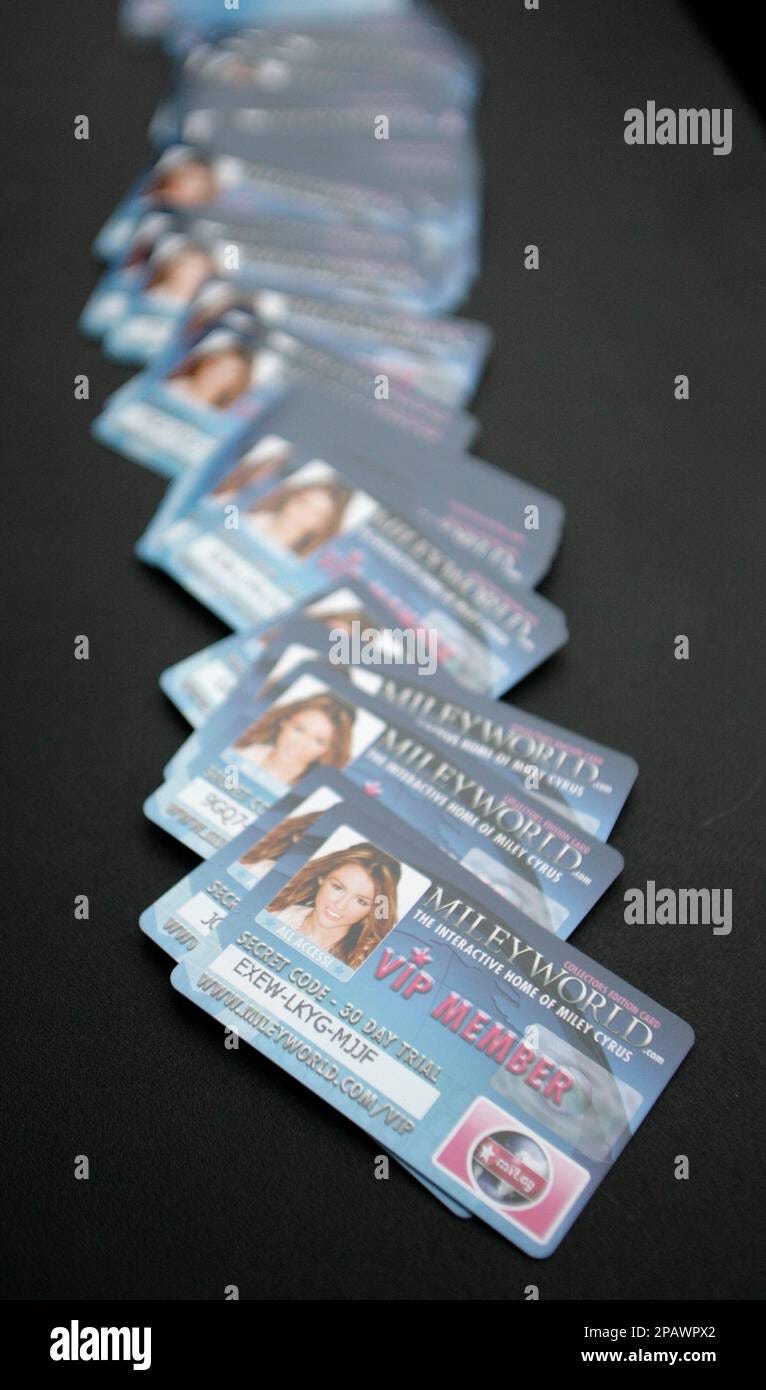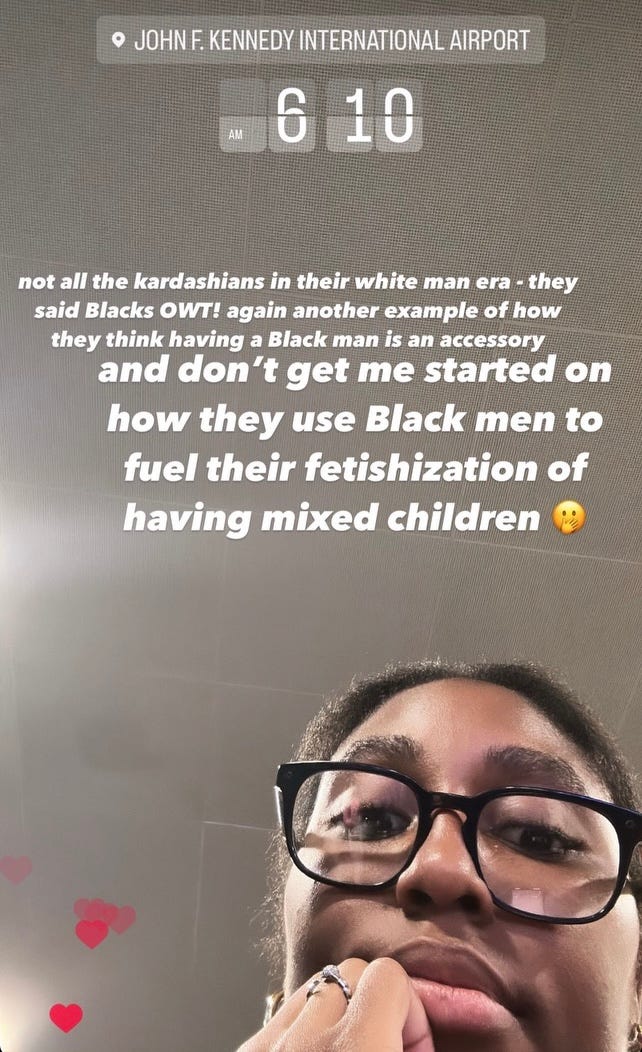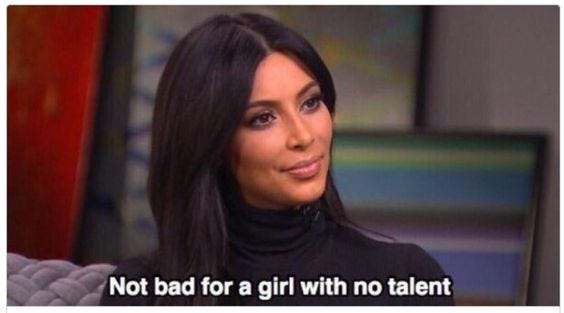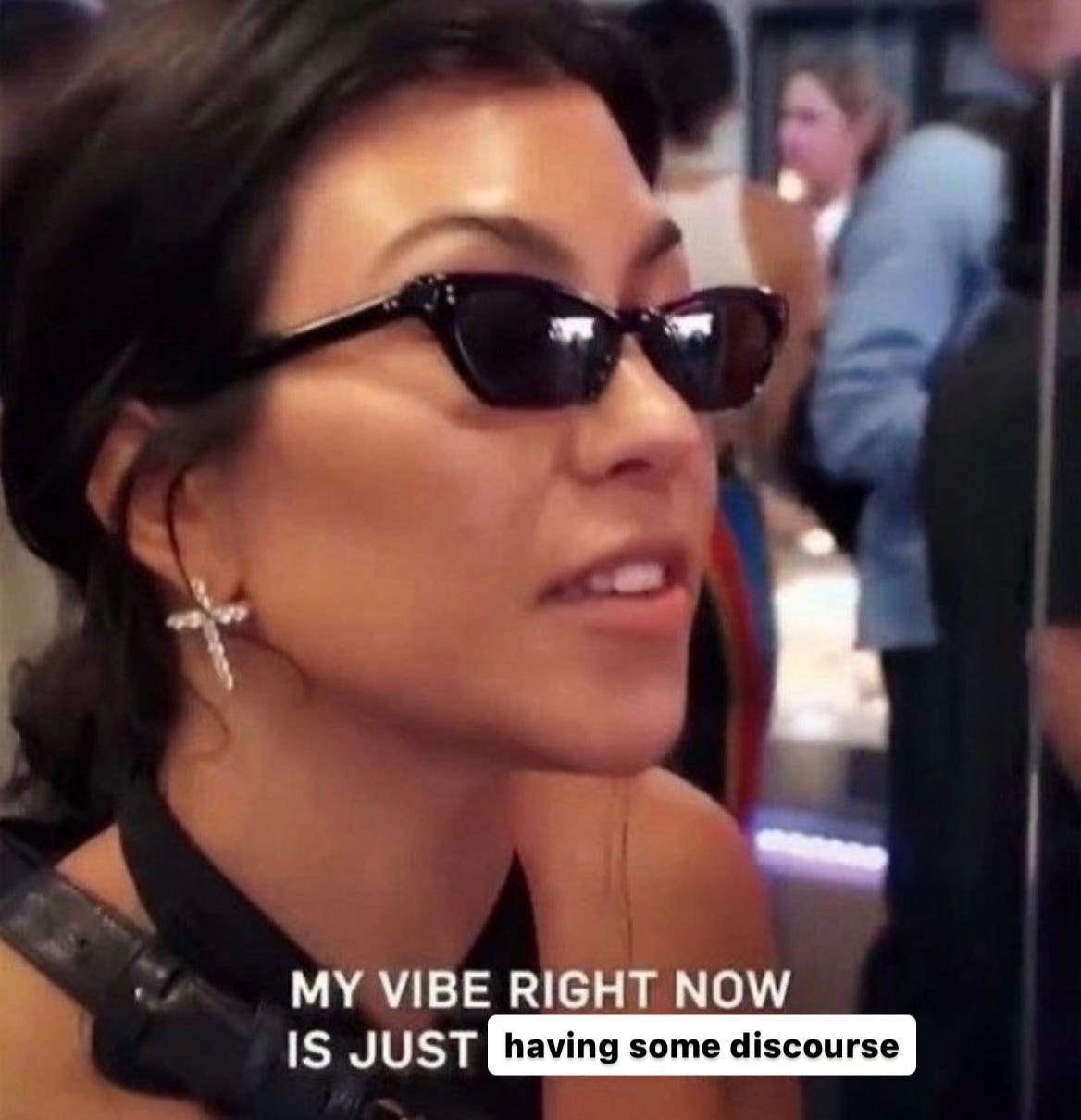Intro to Critical Kardashian Thinking 101
Unfortunately, this piece doesn't pass the Bechdel test but you can't win 'em all
This post is too long to appear in full in your inbox. I don’t know where it will cut off in the email version, but it will be available online. See you there!!!
I am admittedly not a fan of the Kardashians, but I have always been intrigued by their ability to always land on their feet—they perpetually seem to have a new company, a new venture, or a new scandal that keeps them employed and discussed. Even if they’re wrong or stealing from others, they have lasted this long and their relevance will probably outlast us all.
With all that said, I know it’s not unique or breaking news to criticize the Kennedy’s dynastic successors but a recent Instagram story intrigued me enough to strike up a conversation about it with all of you, God, and Kris Jenner’s Google Alerts watching.
This week, I talked with Lexi P. about growing up on the internet, the Kardashians’ fetishization of Black culture, and the online environment that keeps them relevant.
Lexi is a doctor…or she will be one in about eight years. She loves Drake, her family, and posting for her close friends on Instagram. While she’s not currently a Kardashian stan, she has been keeping up with them for long enough and is ready to speak her truth.
It’s Giving Chronically Online. It’s Giving Digital Native.
When my family got a white Macbook that looked, in hindsight, more like Elle Woods’ laptop in 2001 than mine does today, I immediately hoarded it. In my defense, I am textbook Oldest Daughter and I believe we are entitled to first dibs on communal goods as well as lineage.
The hoarding was not just for the sake of it, though, because on this device that probably weighed more than my cat, I got unbridled access to ✨the internet.✨1 The internet showed me music videos and Stardoll and man’s greatest creation, Horse Isle. Now that I’m taking the time to stop and reflect on it, I’m surprised that I wasn’t more overwhelmed by the limitless worlds and potential being offered online but I supposed it does make sense: Gen Z is considered to be the first generation of digital natives which means that “from earliest youth, [we] have been exposed to the internet, to social networks, and to mobile systems” (X).
To kick off today’s conversation, I asked Lexi:
Emily: If you can remember it, what was your first encounter with the internet?
Lexi: I used to be a part of like a Hannah Montana/Miley Cyrus blog website where if you were a VIP member you could get a VIP member card sent to your home (pictured below) and we would gossip in different chat rooms about Disney drama. I also was a big Poptropica gworl, Webkinz, Club Penguin—you name it.
Emily: What are some lessons or just general things you learned from coming of age online?
Lexi: Recently, I've learned that I'm not special and it is both humbling and comforting. Seeing that there are thousands of people online experiencing the same struggles, doubts, and conflicts that you are...Most importantly, I've learned that means that it is not always my place to admit to such things.
The #digi#footprint is so real which is why I respect people like you, who use your platform to amplify the collective voices of those who don't always have the opportunity or place to speak on certain hot topics.
Not to be dramatic but our digital footprint does define our presence on the internet which is why Gen Z is both more readily online but more cognizant of their consumption. As a recent report from McKinsey puts it,
digital natives often turn to the internet when looking for any kind of information, including news and reviews prior to making a purchase. They flit between sites, apps, and social media feeds, each one forming a different part of their online ecosystem. Having grown up with social media, Gen Zers curate their online selves more carefully than those in prior generations have, and they are more likely to turn to trends of anonymity, more personalized feeds, and a smaller online presence, even as they voraciously consume media online.
It’s kind of a no-duh that being online for our entire lives has shaped who we are and how we approach the world, but those specific facets—and turning to the internet for our news, in particular—are key to today’s conversation. Think about it: how much of what we discuss in our everyday lives comes from viral content or social media feeds? The internet in all its breadth and glory has become an inextricable part of being a person in this day and age.
I wanted to know Lexi’s thoughts:
Emily: Do you think the internet drives culture or does culture drive the internet?
Lexi: I was a sociology major in college (shoutout Max Weber) and honestly, comprehending the fact that society and culture have and will be constantly influencing each other was such a big brain energy moment. I used to believe that based on history, culture has been able to survive without the Internet but vice versa is not necessarily true...BUT THAT'S FAKE.
We've evolved as a society to rely on and be driven by the world wide web and beyond, we simply are at the point where we cannot exist without the internet—it's taken the driver's seat of a red Ferrari with a turbo max engine and is going at 1000mph while society is in the passenger's seat along for the ride, whether we like it or not. The only option we have at this point is to STRAP IN!
If you’re on the internet, you know the Kardashians so the only option we have at this point of the newsletter is to STRAP IN!
A Plague on Your Family’s $200 Million Property Portfolio
I recently saw a Tweet written by a woman eavesdropping on a date where a man was adamantly telling the woman he was with that he did not know who the Hadids were—something which a man has also said to me in the past. When I exhausted the “they’re the biggest supermodels, maybe ever” approach, I tried, “They’re close with the Kardashians.” His response? “I know the Kardashians…”
I share this anecdote first because I simply still don’t believe this was true and I probably never will, but second because it proves my point that the Kardashians are abundantly and aggressively everywhere. They’re like that U2 album that just showed up on iPods and iPhones one day—suddenly they’re here and we can’t seem to shake them.
Before we get into some of the shaking that has already occurred, I wanted to ask Lexi:
Emily: Can you give a brief history of your relationship with the Kardashians?
Lexi: 1) I would definitely say I’m not currently a fan but instead am one of the many people “keeping up with” them because, let’s face it, they’re inescapable.
2) I did grow up with my mom referring to them as the “Kartrashians,” so not a great history. But with Kendall and Kylie being around my age, I always found their lives infatuating.
This conversation between Lexi and I technically started a few months ago when she posted the below story after news broke that Kylie Jenner and “Wonka star” Timothée Chalamet were dating:
For context, the Kardashians are Armenian which is a nationality and not a race. According to the U.S. Census Bureau, the American court system, and one of the odder things I’ve had to search for this newsletter, Armenians are considered racially white.2 This is only important to highlight because the Kardashians have been known to culturally appropriate…I’d say pretty regularly (X) (X) (X) (X) (X) (X).
But before I go any further, I wanted to ask Lexi:
Emily: Can you explain what you meant when you said the Kardashians fetishize Black men and Black culture?
Lexi: The definition of fetishization is "to have an excessive and irrational commitment to or obsession with (something)." There's a t-shirt of Kendall and her exes and I think Khloe posted it joking about her "starting lineup" and all of the exes happen to be Black men.
It’s one thing to have a preference in who you're dating, but it's another to kinda start it as a trend in your family. I personally believe this is the Kardashian’s way of having some sort of pass into the life of Black culture without inundating themselves in what it means to be Black and the struggles that come with it.
More than anything, you continuously see the family emphasizing their Armenian ethnicity and background in hopes of people forgetting that they are, indeed, of the white race—again another example of them trying to become as "other-culture" adjacent as they can to try to get away with the Blackfishing.
I want to spotlight a section from MJ Corey’s 2022 New Yorker piece about the once-infamous Kimye. Corey, a psychotherapist who uses social media to break down the psychology behind the Kardashians, wrote that
in the origin myth of Kimye…Kanye was Kim’s superhero, who rescued her from B-list squalor by aligning her with his own hard-won pop-cultural credibility. (At that point, West…was one of the most famous rappers in the world.) In a rare early appearance on “K.U.W.T.K.,” in 2012, West rummages through Kardashian’s closet, trashing the gaudy clothes associated with her Paris Hilton-sidekick era and replacing them with neutral-tone pieces that matched the aesthetic of Yeezy, his burgeoning sneaker venture…Concurrent with his sartorial intervention were date nights to the Met Gala, introductions to his pals in the Paris fashion scene, and a shared Vogue cover. The prevailing cultural observation was that something iconic was happening…
Was this all a little silly? Probably. But Kimye made for clickable, shareable content in a new, social-media-dominated cultural landscape. For Kardashian, whose career had been launched by a sex tape, the rebranding was twofold: she was becoming cool, but she was also becoming more wholesome. For years, she had largely abstained from drinking and swearing, and claimed to stand for traditional family values, despite the moral panics induced by her nude photo shoots and her whirlwind relationships…But her willingness to fully submit to West’s vision teased the possibility that she might take on a new role as her star power increased.
The Kardashians have always been rich and, since time has folded in on itself, it’s felt like they have always been famous, too. But they were the first reality stars to truly be famous for fame’s sake and like many Bravolebrities have learned since, money and notoriety alone can’t buy you class celebrity. Though there don’t seem to be any rules for fame written in stone, to get off the D, C, and even B lists, you need to have actual credibility for actually doing something.
As Corey stated, Kanye “Ye” West’s then-credibility bolstered Kim’s legitimacy: sure, she had been a stylist and personal shopper before, but now she was being introduced to the world of high fashion. It was kind of like an influencer promotion if you think about it. This shift to something established and, honestly, tangible is what has led to Skims, Good American, and now Khy as well as to all of us seeing the Kardashians as people who were worth watching off of the E! network.
Kim’s relationship with Kanye defined both who she is and how we see her, and their breakup has equally become a foundation for Kim to build her identity around. In an episode of Hulu’s The Kardashians, Kim made comments about how dressing herself was a way to signify the ending of the Kanye era.3
When Kanye (now Ye) began to regularly espouse his antisemitic and hateful rhetoric, Kim rightfully filed for divorce. However, in the process, she once again turned her new relationship, this time with Pete Davidson, into a rebrand. Although she and Davidson are no longer together, her appropriation era appears to be over now that she has gotten everything she wanted from Black culture while giving next to nothing in return.
And she’s not the only one.
…If It Weren’t For the Baby
To an extent, Kim’s younger half-sister Kylie Jenner has followed in her footsteps in more ways than one. Now, after deciding she is, in fact, 26, Kylie is done dating older rappers to make scandalous headlines. Instead, she’s now into posting wholesome picnic film photos taken by Pete Davidson’s dear friend.
Dating Timothée at this peak in his career, like dating Travis Scott in 2017, is a fantastic strategy for relevance but perhaps not for love—at least that’s how it appears to Lexi. Knowing this new relationship was the catalyst for her above post, I asked:
Emily: What about Kylie and Timothée’s relationship led you to post your commentary about the Kardashians' relationships with Black men? Why did that development specifically provoke those thoughts and feelings?
Lexi: I think Kylie's dating history and having a second baby with her most recent ex [Travis Scott] is what made that commentary come to mind. The idea that it appears that she was simply in the relationship to get her two mixed kids out of it and then dip was interesting to me.
It’s not just interesting to Lexi: in a 2021 episode of the podcast The Waves, writers Robin Boylorn and Allegra Frank talk about this exact topic: Boylorn (who had previously written a piece for Slate about the discomfort she had felt watching Keeping Up With the Kardashians as a Black woman) explains that the family “often benefit on the backs of Black people without ever really having to engage with or be held accountable to the Black community.” She goes on to state that
while they’re not the first or last celebrities to be accused of cultural theft, the blatant erasure of Black women and the failure to affirm them is troubling. And I think it’s also especially troubling because these are women who are in interracial relationships with Black men. These are women who are now parenting biracial children…I think that there have been efforts from them as mothers that demonstrate a racial reckoning that was not present in their earlier years, because it was one thing to date Black men, but it’s another thing to raise a Black child…
We see Kim Kardashian being more involved in the criminal justice system and seeking justice for people. And I think that’s important. And I think that is informed by her now being a mother to Black children. We’ve seen Kylie’s attempts at figuring out how to do her daughter’s hair. And so I think that those are really good examples of a positive way that they’re able to now use the platform to create some type of consciousness that they now have as parents (X).
For the remainder of the episode, Frank and Boylorn grapple with whether these improvements are enough. While that’s not a question for me to answer, the one point that neither picks up on is how both moments Boylorn highlighted were either caught on camera or constantly mentioned in relation to Kim’s legal career—in other words, they’re yet more things the family can profit from.
That might sound dark considering we’re talking about children and not a brand sponsorship on TikTok, but children have nearly always been a part of the Kardashian brand—Mason Disick was born just two years after KUWTK launched. Corey also mentions the importance of children to the Kardashians even before their relationships are truly established: in 2011, just before her relationship with Kanye went public, Kim told Glamour that she wanted to have six kids before dramatically claiming that maybe she wasn’t meant to have them.
The importance of children to a large family would be more benign if the children in question weren’t constantly used for content or leveraged against their fathers. It feels icky!!! The whole thing is so icky!!!
With my shoulders hiked up to my ears, I asked Lexi:
Emily: There's been a lot of conversations about how the Kardashians objectify and commodify Black culture, but you're more focused on their relationships with Black men and their biracial children. Is it too dramatic to wonder if those are not more things they've commodified?
Lexi: At the end of the day they're getting what they want out of those relationships and abandoning the men they've chosen as partners and kids of their fathers when most convenient for them, only to leave them as another victim of the “Kardashian Kurse.”4
Perhaps I’m more cynical than ambivalent toward the Kardashians but even if I was entirely neutral, it would be hard not to see the pattern Lexi has laid out: these women have found a weird loophole into the culture they’ve been appropriating for years by dating and marrying Black men and having biracial children. But because of their whiteness and fame, they’re able to avoid any ramifications and dodge pretty much any line of questioning about this.
But why?
Critical Thinking? In This Economy?
By and large, the Kardashians are content and we, as consumers of content, keep them perpetually in demand whether we individually love them, hate them, or couldn’t give a shit about them.
For what I would imagine is a good number of people, the Kardashians—their lives, their feeds, and their shows—are purely entertainment. They’re smooth brain content to enjoy at your leisure when you need a break from doing heavy mental lifting. The above conversations have been and will continue to be had, but they don’t stick for a lot of people who just like the Kardashians but don’t feel the need to earnestly engage with them.
Thinking about this in the context of our Scandoval conversation from earlier this year, I wanted to ask Lexi:
Emily: I think a lot of people would brush off any conversation about the Kardashians as frivolous or gossipy. Do you think it important to talk about them and what they do critically and, if so, why?
Lexi: Honestly, it's not...but I think it's the PRINCIPLE of it all that could easily be a point of conversation. Remove their famous surname and replace them with a family you know from your hometown and I'm sure they would continue to remain a topic at any Thanksgiving table.
Emily: Do you think it's important to think critically about the content we consume—even casually, or as a "guilty pleasure"—and, if so, why?
Lexi: For me, my brain during the workday is constantly on 100% and being critically challenged, so I LOVE guilty pleasure, brainless content that can be consumed without critical thinking. With that, when I am engaging myself in something that I usually deem to be casual and without consequences and it actually starts making me think, I choose to turn it off, stop reading, and unprocess. It's adding to my already full critical thinking plate and is not personally affecting me.
But for people whose main source of engagement is content—why not unpack it? There is stuff there to unpack and critically engage with, as long as you’re challenging the brain and igniting some sort of discourse, there's some sustenance there!
More to the point, I don’t think as many people are having “hard conversations” about the Kardashians as we may think. Remember the statement from the McKinsey report? Our feeds are becoming more personalized so we’re seeing more content similar to what has previously resonated with us. It may feel like everyone is talking about the Kardashians in some way or another, though in reality, that’s probably just within our own digital echo chambers.
But maybe that’s not always a bad thing…? Walk with me:
Emily: When we spoke, you said something interesting about how we predominantly see news like this online rather than in more traditional publications, and that these conversations happen in the comments section or via Tweets. How do you think that affects the conversations themselves, as well as how we as a society approach them?
Lexi: It allows for transparency and authenticity in these conversations. It allows for a space for people to think, "OMG I WAS THINKING THE SAME THING!" and realize their opinions are valid without having to necessarily seek that validation in their lives. Our feeds are tailored to surround us with news, people, and accounts that constantly pique our personal interest and it's all in the palm of our hands.
I can’t help but think about the paradoxical existence of more personalized feeds like we previously mentioned and this collective experience we often share online over news or celebrity gossip. The internet has become a uniquely shared adventure, like a Rorschach test in which we’re shown different versions of the same information and all walk away with our own understandings.
Maybe that’s why the Kardashians will never truly fade: they’ve found a way to exist so much in so many different corners of the great online, and commercialized enough elements of human life, that someone somewhere will always look at their photos and companies and lives and will choose to celebrate them rather than critique them. I’m not saying it’s good or right or even wrong—it’s just the function of the internet, and they’ve cracked its code better than anyone else.
Before we end, I did want to ask Lexi the age-old question:
Emily: Who works harder: the Devil or Kris Jenner?
Lexi: If I'm not mistaken, I've seen both the Devil and Kris Jenner wear Prada…if A=B and B=C, then A=C 👀…
Thank you so much to Lexi for being a gem of a human, so much fun to talk to, and my doctor in about eight years!!!
Ok, so not unbridled. My parents are cool but they were not particularly laissez-faire or, in contemporary terms, chill.
There’s a proposal to create a MENA, or Middle Eastern or North African, category on the Census—which is part of a larger, very interesting conversation—but it appears that that might not pertain to Armenians.
I also want to remind us of the final E4P of 2022 in which we also discussed Ye and how America’s obsession with race is actually the real villain because, “if we weren’t, we would clearly see how all of white supremacy is nothing more than a bigot’s backward, delusional David and Goliath fairytale and we would wonder why we spent so much time fighting one another instead.”
While I’m committed to being accurate here at E4P, there’s absolutely no way I will rewatch the show to find the exact episode this was in. Yeah—I watched the first season of the Hulu show!! So take my word for it: a comment like that was in there…somewhere.
To be fair, as Lexi pointed out during our conversation, Kourtney Kardashian hasn’t played into her sisters’ trend and Kendall has not had the Kardashian urge to get pregnant yesterday. Although it should be noted that Rob Kardashian has a child with Blac Chyna and Kris Jenner has been in a relationship with internet personality Corey Gamble for nearly ten years.









